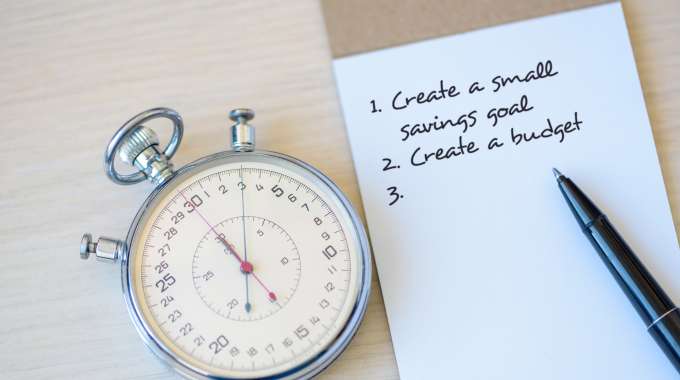Making the right financial decisions isn’t just for the big-ticket purchases in your life. It’s about cultivating the right daily habits, and habits are formed when simple actions are performed consistently.
Here are just a few of the ideas that you can start today to get control of your finances and start building toward a brighter financial future.
Try these five simple fixes to help you start saving, build a budget that works for you, minimize unnecessary spending, maximize your credit cards, and get up to speed with your credit rating.
1. Start Saving by Starting Small
The best way to succeed at anything challenging is to start small. With your personal finances, you can do so by creating a small savings goal to keep track of on your journey to financial stability. Setting money aside is an important part of getting your finances in order, and, by starting small, you’ll create a sustainable habit that will set you up for success.
“The journey of a thousand miles begins with one step” – Lao Tzu
You can even start saving with amounts as little as $1. In taking your first steps today, you’ll be able to see your finances change for the better until, soon enough, you will be creating and achieving larger savings goals.
How to Start Saving Today
- Create a short-term savings goal (vacation money, rainy day fund, etc.) You can save just for the sake of saving, but it’s motivating when you have a goal to work towards.
- Log into your online banking accounts page, and find a link that reads “open a new account”. (If you already have a savings account, skip to step 4.)
- You will be shown some options. Choose a Savings Account.
- Select your online checking account and find an option that says “Setup Pre-Authorized Transfer”. This will let you automate periodic transfers from your checking account to your savings account, so you don’t have to manually transfer the money yourself. You can set a reminder to transfer the money manually if you prefer, but automation will make it even easier to save regularly.
- If you’re not sure how much to transfer or how frequently, remember: start small but be consistent.
2. Create a Budget
The introduction of a budget has proven to be one of the most fool-proof methods to promote financial security while encouraging mindful spending and living
”It is not necessary to do extraordinary things to get extraordinary results.” – Warren Buffet
While it sounds daunting to many, budgeting is just simple planning – planning how much you’re spending and where you’re spending it. A budget should never make you feel restricted, it should make you feel confident and empowered, as you’re finally taking control of your finances.
How to Start Budgeting Today
There are several methods for you to effectively manage your budget:
- The traditional paper trail route
- Tracking expenses with a digital spreadsheet
- Downloading a budgeting application
In just a few minutes, you could have your annual budget drawn out and organized, and you don’t need to be a math or accounting whizz to do it either!
3. Eliminate Unnecessary Spending
If you find yourself almost penniless or in credit card debt the day before you’re supposed to get your paycheque, you’re living paycheck to paycheck. That’s a stressful way to live. As we mentioned above, small-but-consistent contributions can help you build a sizable nest egg. On the flip side, it’s the small-but-constant expenses that burn a hole in your wallet and decimate your bank account.
Take streaming services, for example. They have become one of the most popular forms of monthly subscriptions, with many Canadians owning accounts with multiple providers. Netflix, Disney+, Amazon Prime, TSN… it’s too easy to lose track!
“He who buys what he does not need steals from himself” – Swedish Proverb
How to Reduce Your Spending Today
- Examine your bank statements over the last 30 to 60 days to identify all of your subscriptions. Create a list of them. There are a few apps available to download that can help you with this.
- In your head, perform a quick cost/benefit analysis of each. Do you use them all frequently enough to justify keeping them?
- Figure out which one adds the least value to your everyday life.
- End that subscription.
Get rid of that one expense and notice how you feel afterward. It’s one small action that you can take today, but the positive consequences of this frugal behaviour cannot be understated.
4. Maximize Your Credit Card
If you can develop a strong understanding of how credit cards work, it can go a long way toward finally repairing your finances. Established credit card management tips, such as treating your credit card account the same as your debit account, will save you from avoidable debt and help keep your spending in line. And if you use your credit card as you would your debit card, you can rack up the benefits too!
“Don’t cut up your credit cards, the problem is not the cards, it’s the lack of financial literacy of the person holding the cards…” – Robert Kiyosaki
How to Start Maximising Credit Cards Today
Cut up your debit card and put all future purchases on your credit cards. This advice might sound controversial, but there’s good financial sense behind it. When you spend on your credit card, you’ll get certain perks that your debit card simply just doesn’t offer – cashback, points, boosts to your credit score, you name it.
While charging daily groceries to your credit card might seem ridiculous at first, you’ll soon come to learn that these small purchases add up. Of course, this tip is only advisable if you know and follow the golden rules for credit cards: never exceed your limit, never spend more than you have, and always pay your full balance off on time or, even better, in advance.
Bookmark ratehub.ca. This site compares all credit cards on offer in Canada to help you choose the financial products that best match your lifestyle. Keep an eye out for the benefits, bonuses, and rewards that certain cards provide. With the right education, you’ll be able to put the right credit cards to work for you!
5. Know About Your Credit Score
Yep, that 3-digit number is pretty important. Your credit score is your financial reputation, and you should always be interested in achieving the highest possible score. A strong credit score can be your gateway to several milestone events, such as purchasing your first car or making an offer on your dream home.
“If you don’t take good care of your credit, then your credit won’t take good care of you.” – Tyler Gregory
Your credit score fluctuates based on a variety of factors. The good news is, that means you can improve it! But first thing’s first – if you don’t even know your credit score, take five minutes today to set yourself up with a way to regularly monitor your credit and get free advice about improving it.
How to Start Monitoring Your Credit Today
With Borrowell, you can easily track your credit score and work towards improving it, setting yourself up for exciting opportunities in the future.
Here’s how it works:
- Sign up in as little as three minutes to get access to your Equifax credit score and report, for free.
- Get a clear understanding of what your credit score means through Borrowell’s AI-powered Credit Coach, which will provide you with tips and resources that are specific to your unique financial needs.
- Find the best financial products for you with recommendations that are personalized for you and sent to your inbox so you don’t miss them.
With these five fixes in your back pocket and the dedication to successfully implement them, you’ll be able to see your finances flourish slowly and surely, leading you to a promising and well-balanced future. The small steps that you take now will fuel the large leaps that you strive for in years to come.








